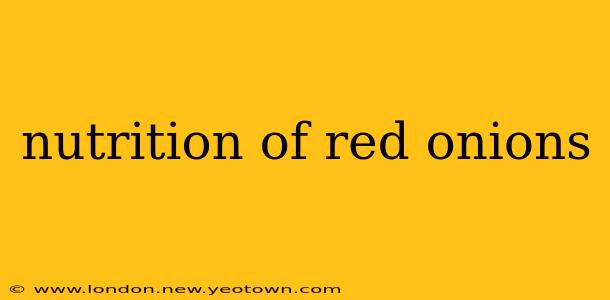Red onions, those vibrant crimson globes that add a sharp bite and beautiful color to our dishes, are more than just a culinary staple. They're packed with a surprising array of nutrients that contribute to overall health and well-being. This isn't just about adding flavor; it's about adding a potent dose of vitamins, minerals, and antioxidants to your daily diet. Let's peel back the layers and discover the nutritional secrets hidden within this humble bulb.
What are the health benefits of red onions?
The health benefits of red onions are numerous, stemming from their rich concentration of beneficial compounds. Their vibrant color is a clue to their nutritional prowess – it's a testament to their high levels of anthocyanins, powerful antioxidants responsible for their deep red hue. These anthocyanins are linked to a reduced risk of various chronic diseases, including heart disease and certain cancers. Beyond the anthocyanins, red onions are a good source of vitamin C, a crucial antioxidant that boosts the immune system and protects cells from damage. They also contain vitamin B6, crucial for brain development and function, and folate, essential for cell growth and development. Furthermore, they're a decent source of potassium, vital for maintaining healthy blood pressure.
Are red onions good for weight loss?
While red onions won't magically melt away pounds, they can certainly contribute to a healthy weight management strategy. Their low calorie count and high fiber content promote feelings of fullness, reducing overall calorie intake. The fiber also aids in digestion and helps regulate blood sugar levels, preventing those energy crashes that often lead to unhealthy snacking. Incorporating red onions into your diet as part of a balanced, calorie-controlled eating plan can support your weight loss goals.
What are the nutritional values of red onions?
A typical medium red onion (about 100 grams) provides roughly:
- Calories: 40-50
- Fiber: 2-3 grams
- Vitamin C: 10-15% of the recommended daily intake
- Vitamin B6: 5-10% of the recommended daily intake
- Folate: 5-10% of the recommended daily intake
- Potassium: 5-10% of the recommended daily intake
These values can vary depending on the size and type of red onion.
How many red onions should I eat per day?
There's no magic number of red onions you should eat daily. It's best to incorporate them into your diet as part of a balanced and varied eating plan. Adding a half to a whole onion to your meals daily, or several times a week, provides a beneficial boost of nutrients without overwhelming your diet.
What are the side effects of eating too many red onions?
While generally safe, consuming excessive amounts of red onions can have some side effects. These can include heartburn, indigestion, and gas due to their high sulfur content. Some individuals might also experience an allergic reaction, characterized by skin rashes, itching, or swelling. If you notice any adverse reactions, reduce your intake or consult a doctor.
Conclusion: Adding a Pinch of Purple to Your Plate
Red onions are a nutritional powerhouse that shouldn’t be underestimated. They offer a delicious and convenient way to boost your intake of essential vitamins, minerals, and antioxidants. By incorporating them into your meals regularly, you're taking a significant step towards enhancing your overall health and well-being. So, next time you’re preparing a meal, remember the vibrant red onion – it’s more than just a flavor enhancer; it’s a nutritional champion.

